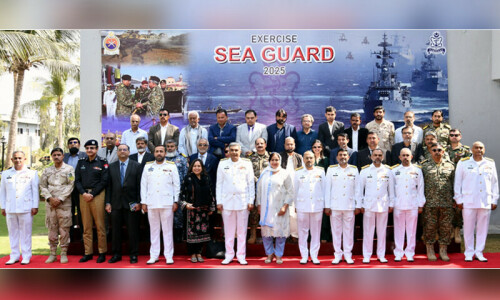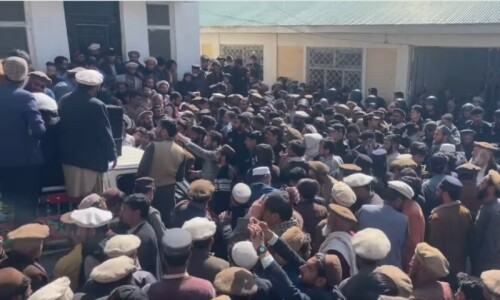ISLAMABAD, Dec 15: Reliance on military for a solution to the Balochistan crisis is not viable and needs to be done away with, says a research report presented at the ninth sustainable development conference held here on Friday.
The report “Balochistan Crisis – A regional conflict unfolding over Suleiman Range” brings vivid and horrifying details of the military operation in Balochistan to the forefront.
According to the report, the Taliban insurgency, US-Iran tension, the Durand Line issue, Chinese investment in Pakistan and the alleged Indian assistance to Balochistan insurgents are significant security threats to Balochistan and Pakistan.
It says that since December 2005, the conflict has resulted in a major loss of lives and heavy collateral damage. The government has confessed to having used air force and its estimates have put the death toll at 192 lives. They include 42 members of security forces, 88 militants and 62 civilians. The violence has caused injuries to at least 400 people, the report says.
The report, read by researcher Nizamuddin Nizamani, says that while the government had conceded arresting ‘a few hundred insurgents’, local political parties claimed detention of more than 4,000 people, only 200 of whom have been produced in the court.
The report says the government had declared in December 2005 that the insurgency would be quelled in one month, but it had not happened despite the passage of 11 months. On the contrary, militant activities appear to be on the rise in frequency and magnitude, it notes.
The study validates the hypothesis that the conflict in Balochistan is expanding in terms of magnitude and dimensions and it may affect neighbouring provinces and countries.
The report recommends constitution of a commission comprising civilian experts in development, psychology, sociology, political sciences and regional strategy with a task to reassess the situation in Balochistan on the basis of demands of nationalist forces, academicians and senior Baloch bureaucrats.
The report suggests removal of check-posts manned by paramilitary and other federal agencies and a halt to construction of non-strategic military cantonments in the province.
It also proposes that a general amnesty should be declared and political prisoners released to build an environment of trust in the area. It is also suggested in the report that drastic administrative and infrastructural reforms should be carried out in the province, followed by more powers and autonomy to all provinces like federal systems of the US, Germany, India and the United Arab Emirates.
The report recommends drastic administrative measures and transparent elections for enhancing human security indicators in the province.
It calls for reviving the National Finance Commission and the Council of Common Interests and limiting the federal government’s share in revenue to what was mutually agreed between the provinces and the Centre in the past.
















































